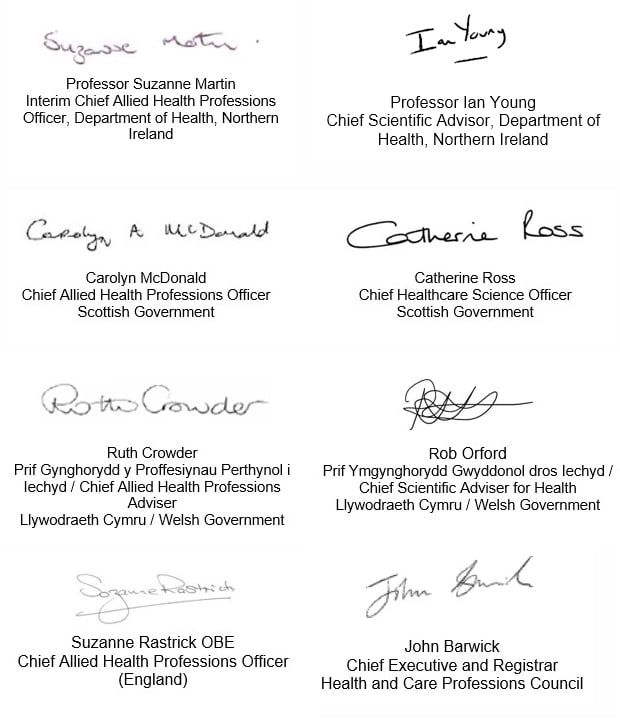
Dear colleague,
The Allied Health Professions (AHPs) continue to make a significant contribution to the Covid-19 response. We are immensely proud of the AHP community for their continued professionalism and focus during the pandemic.
Against the backdrop of the Omicron variant we know that you continue to work tirelessly to improve Covid and non-Covid care. We are dedicated to doing what we can to ensure you feel supported as you continue to deliver the best possible services through this challenging time.
Joint statement from chief executives of statutory regulators of health and social care professionals
We want AHPs, in partnership with patients, to use their professional judgement to assess risk and to make sure people receive safe care, informed by the values and principles set out in their professional standards.
In December 2021, the regulators of UK health and social care professionals (including the HCPC) reiterated their support for staff working together to tackle the ongoing pandemic and seasonal pressure on services.
The following statement can be located on the HCPC webpages:
Joint statement from chief executives of statutory regulators of health and social care professionals
We hold the registers of health and social care professionals in the UK. We support those professionals to deliver better, safer care by setting the standards they need to meet, to act in the best interests of patients and people who use health and social care services at all times.
As registered professionals, the first concern of the individuals on our registers will be the care of their patients and people who use health and social care services. We encourage health and social care professionals, working in partnership with each other and people using services, to use their professional judgement to assess risk and to deliver safe care informed by any relevant guidance and the values and principles set out in their professional standards.
We recognise that in highly challenging circumstances, professionals may need to depart from established procedures in order to care for patients and people using health and social care services. Our regulatory standards are designed to be flexible and to provide a framework for decision-making in a wide range of situations.
They support professionals by highlighting the key principles which should be followed, including the need to work cooperatively with colleagues to keep people safe, to practise in line with the law and the best available evidence, to recognise and work within the limits of their competence, and to have appropriate indemnity arrangements relevant to their practice.
We recognise that the individuals on our registers may feel anxious about how context is taken into account when concerns are raised about their decisions and actions in very challenging circumstances. Where a concern is raised about a registered professional, it will always be considered on the specific facts of the case, taking into account the factors relevant to the environment in which the professional is working. We would also take account of any relevant information about resource, guidelines or protocols in place at the time.
We will continue to issue profession specific guidance to our registrants to provide additional support where that is needed.
Supporting the Allied Health Professions of the future
We remain committed to ensuring the long-term prospects of AHPs in training and are working with the education bodies in the four nations to maintain as far as possible student education programmes.
We urge you to support this and continue to offer student placement opportunities wherever possible. At the start of the pandemic the HCPC outlined their approach to regulatory flexibility that is already embedded within the HCPC Standards of Education and Training.
This flexibility continues and has been reinforced by the new HCPC Education Quality Assurance Model launched in September 2021.
Regulatory (HCPC) sign off on any local arrangements made is not required, but higher education providers are responsible for ensuring these meet regulatory standards, and that they can provide evidence to support this should it be requested by the HCPC through its monitoring processes.
The following principles apply when considering any changes:
- Education providers must ensure individuals meet the standards of proficiency prior to final award of the degree
- Education providers must be satisfied that amended placement arrangements continue to meet the HCPC's education standards (particularly in relation to provision of practice-based learning)
- Students must continue to be appropriately supervised and provided with suitable opportunities to meet learning outcomes
Support for professionals’ health and well-being
We want to thank you sincerely for all your efforts.
The impact of the Covid-19 pandemic has particularly driven home the strength and versatility of our AHP community. Below our signatures are useful weblinks to support employees, employers, and students in maintaining well-being through this challenging time.
Regards,

Well-being support
Health and Care Professions Council (HCPC)
The HCPC Covid-19 hub provides several helpful resources to registrants,
employers, and students. These resources cover maintaining standards through this
challenging period, changes to practice, nurturing well-being, and managing stress.
England
The NHS in England has put in place a wide range of resources for staff available
through the NHS England » Supporting our NHS people webpages
Northern Ireland
The HSC in Northern Ireland has put in place a range of initiatives across it’s
organisations to support staff well-being, the resources are available via the Public
Health Agency Website
Wales
There is a multi-layered well-being offer for our health and social care workforce in
Wales, the suite of resources is available via the Health Education and Improvement
Wales (HEIW) website: Well-being resources released for NHS Wales staff - HEIW
Social Care Wales have also developed resources for Social Care workers: Well-being Tools for Care Workers in Coronavirus | Social Care Wales
